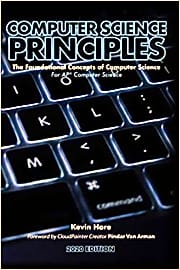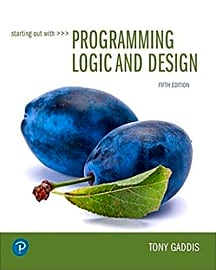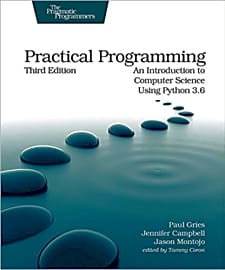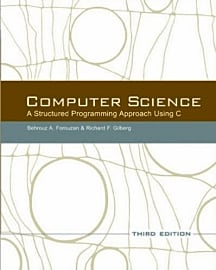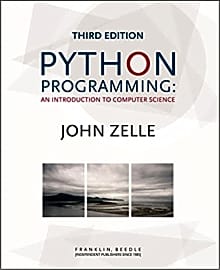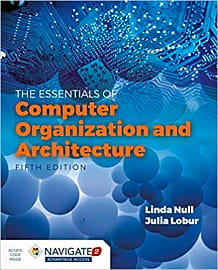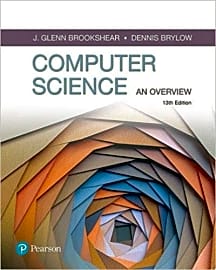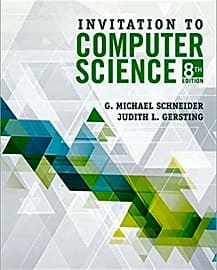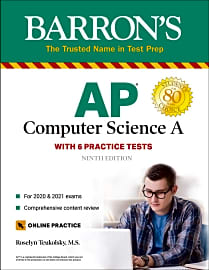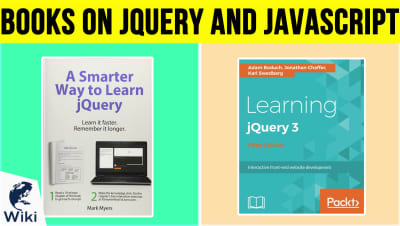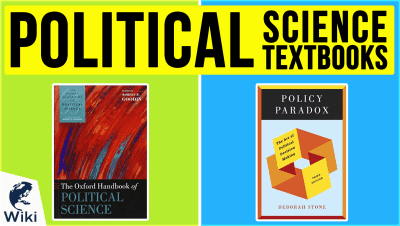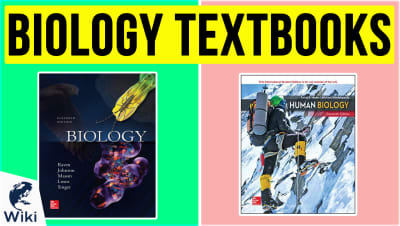The 10 Best Computer Science Textbooks


This wiki has been updated 32 times since it was first published in May of 2017. With industry-related employment expected to grow at a booming pace over the next couple of decades — more than 20 percent from 2016 to 2026, to be more precise — students looking to enter this promising field, or anyone considering a career change, would do well to pick up one of these computer science textbooks. We've included options geared towards beginners and those with advanced knowledge. When users buy our independently chosen editorial picks, we may earn commissions to help fund the Wiki.
Editor's Notes
October 27, 2020:
Computer science is a vast subject and, as one might expect, the books about it can run the gamut from those focused on theoretical studies of algorithms to more practical tasks of actually implementing computing systems on both the hardware and software sides. Unlike programming books, which are language specific, many computer science books are language agnostic, so the information you learn can often be applied no matter what coding language you choose to specialize in. That being said, you can expect to find code snippets in most of the these texts, so to get the most from them, it can be helpful to have some underlying knowledge of popular coding languages, though by no means is it a requirement.
Despite my comments above, there are some books here that do take a language-specific approach. For example, Computer Science: A Structured Programming Approach, which is a classic tome with information that is just as relevant today as when it was written more than a decade ago, provides a syntax-specific introduction for working with C, though it still contains a lot of theoretical information that can be valuable no matter what language you work with. Similarly, An Introduction to Computer Science Using Python 3.6 and Python Programming: An Introduction to Computer Science both have a focus on Python, but by no means should be considered simple programming books as they cover many of the underlying concepts of computer science, and both are suitable for novices with no prior knowledge.
If you prefer something that takes a birds-eye view on computer science theories, ethical issues, and hardware components, essentially giving you a big picture understanding of various computational subject matter, Essentials of Computer Organization, Architecture and Computer Science Illuminated, and Computer Science: An Overview are going to be good choices.
March 10, 2019:
Computer science is an interesting field that covers a very broad range of subjects. Unlike programming books, these texts will often include a lot of abstract and theoretical information that prompts you to really think about the subject matter. We wanted to ensure there was something on the list for readers of every skill level. Those who consider themselves to already have a decent base of computer science knowledge and some perhaps programming experience should probably consider Computer Science: A Structured Programming Approach, Essentials of Computer Organization and Architecture, and An Introduction to Computer Science Using Python, as these all delve quite deeply into many of the topics. If you are first dipping your toes into the field, Computer Science Illuminated, Computer Science Principles: The Foundational Concepts, Starting Out with Programming Logic and Design, Invitation to Computer Science, and Computer Science: An Overview are all good introductory textbooks. AP high school students preparing for the exam and planning on entering college in a computer-related field should look to Barron's AP Computer Science. Those who are getting ready to leave college and move into the professional arena will find Cracking the Coding Interview a very helpful read, as it will help them ace those upcoming interviews.
Before The Revolution
The next 100 years saw engineers use a wide range of incompatible methods to construct computers both electronic and mechanical.
Very few developments have impacted humanity as broadly and profoundly as computers have in less than a century. Obviously, what you're reading now — and everything else on the Internet — is stored in and reproduced by a computer, but PCs are just the tip of the iceberg. While groundbreaking inventions such as refrigeration systems, antibiotics, automobiles, and vaccines have all made huge differences in our lives, each of those technologies now relies on a set of microchips. Even though our society didn't start off with computers, it's now wholly invested in them, and in some cases dependent upon them.
The ancient Greeks began the known study of mechanized calculation with the Antikythera mechanism, a complex system of gears used to predict astronomical events. And, like so many technological developments of antiquity, this scientific understanding was buried for many hundreds of years as Europe stumbled through the religion-steeped Dark Ages.
The first modern computers were huge, complex, mechanical contraptions weighing many tons. An early engineer named Charles Babbage spent the middle portion of the 1800s perfecting his steam-powered Analytical Engine. Mechanical arithmetic devices had been around for hundreds of years, but Babbage designed his computer to use computational instructions read from a removable punch card, rather than a fixed set of operations. This flexibility helped make the Analytical Engine the first fundamentally complete computer in history, which is why many historians consider Babbage the father of the discipline. Babbage's assistant, Ada Lovelace, wrote the algorithms on which it ran, and is widely viewed as the first computer programmer.
The next 100 years saw engineers use a wide range of incompatible methods to construct computers both electronic and mechanical. In the mid-1930s, switching circuit theory and the Church-Turing Thesis helped unify and inspire the future of computer science — well before the microchip even existed, in a time when the U.S. Navy still used systems of gears, cams, and levers to aim artillery. The entire landscape changed in 1947, however, with the birth of the transistor, which led to the first vestiges of the Digital Revolution.
The Inescapable Machine Takeover
Computer science has massive influence on everyone's daily lives, even if we can't see it. From the alarm clock that starts each day to the sensors that never stop monitoring nuclear power plants, both the mundane and the absurdly important rely on tiny bursts of electricity traveling down precise and sensitive pathways. The incredible wealth of related interests directly reflects how pervasive the science is in our world.
Computer science has massive influence on everyone's daily lives, even if we can't see it.
Humanity's best thinkers are constantly collaborating, determining what processes could hypothetically be automated, while our brightest mathematicians help them discern what's fundamentally possible. Similarly, some of the most studious and analytical young minds are enthralled by program and instruction design, as multitudes of exacting, extensively trained engineers turn silicon and gold into frameworks for the coders' creations. Some of these talented individuals dedicate their entire careers to the relationship between computers and their audio and video outputs; we have them to thank for immersive audiovisual experiences. Furthermore, the process behind making nanometer-scale transistors is unlike that of any other product in the world. Also critical are the systems analysts, who plan, install, implement, monitor, and repair the whole thing after it's constructed, while also having the social and communication skills to deal with clients.
Far removed from the home PC world, computing's theoretical side lives on the very cutting edge of modern technology. It got a jump-start from Vannevar Bush's 1945 essay As We May Think, which inspired the idea of hypertext as well as the invention of the mouse. Today, some of the world's most brilliant minds search for ways to completely revolutionize computing machines once again. Almost as quickly as CERN researchers can slam two particles together, others use that data to imagine how we can build computers using a wildly unfamiliar set of physical laws, as well as materials that are currently impossible to photograph. That's where computer science is headed; if you want to go with it, you have to start somewhere — and one of these books would make a great jumping-off point.
A Bright And Vast Future
The field of computer science isn't exactly a science in the classical sense. Rather, it's the meeting point of physics, mathematics, and electrical engineering, and it encompasses a huge number of disciplines overall. It's said that there are three main classifications within the field, but as with so many modern digital standards, no-one seems able to reach a consensus. However you divide them, there's a massive selection of careers and hobbies suitable for many different kinds of people.
By its nature, computer science offers quite a lot of starting points depending on your specific interests. There's an app built to control or monitor nearly every human activity, and many people find today's programming languages to be capable and powerful, if a bit challenging at times. There's no shortage of research and development positions available, particularly if you're a fan of the increasingly important and viable electric car. And although developers work hard to ensure that PC components and high-end software remain compatible with one another, it pays to have a bit of technical understanding before waging war with Windows in a quest for high resolutions and trilinear filtering. In addition, it's hard to miss the flood of new smart-home products, some of which seem like they require a science degree just to set up. All of these peripherals, plus a nearly endless list of others, combine to form a rapidly expanding job market in many divisions of the IT sector.
Whether you're programming new distribution algorithms to help feed the world, or just shoehorning a chunky GPU into your old desktop, there's a book, as well as a huge number of relevant certificates and degrees, that will help you get the most out of the 1s and 0s, no matter where in the process you want to be.


